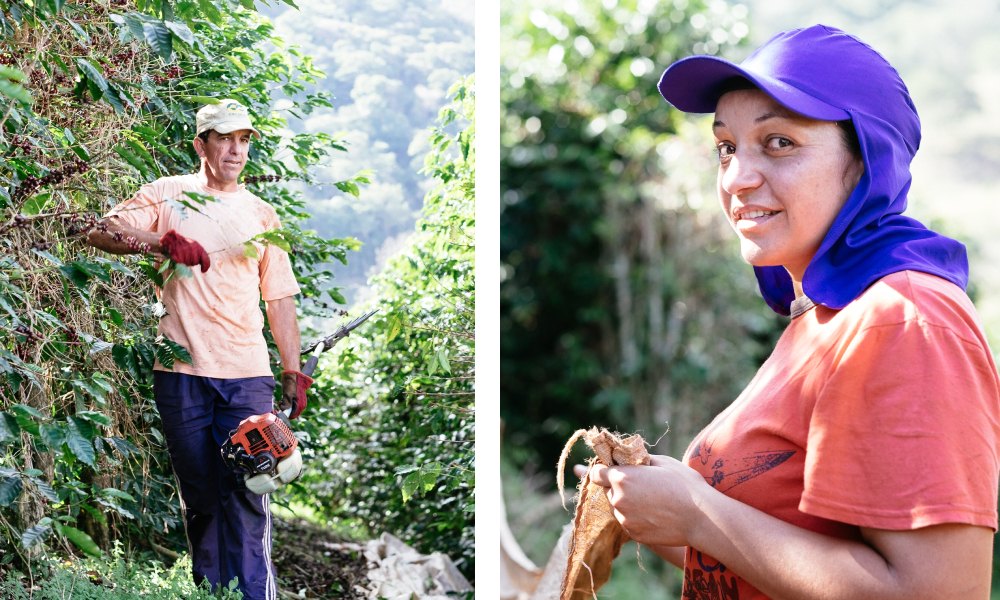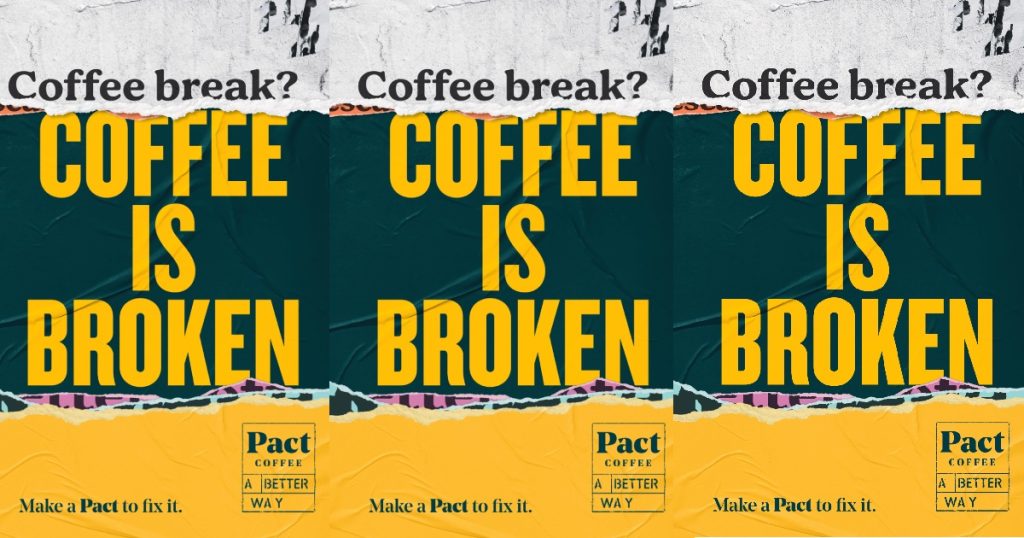‘Coffee Is Broken’: Behind Pact Coffee’s powerful marketing campaign
Benedict Smith speaks with Will Sowerby of Pact Coffee about why the industry needs to shake up its approach to marketing coffee.
If you travelled on London transport during 2021, chances are you would have seen the billboards. Or, if not, you may well have been listening to the radio and heard the ad: “Coffee break?,” asked the voiceover. “Coffee is broken. There are too many under-paid farmers and over-roasted beans. It’s time to make a better coffee for the farmer and for you.”
UK specialty roaster Pact Coffee was launched in 2012. From the outset, it has done things differently to most other coffee brands at the time. It speaks candidly about supply chain transparency, espouses the benefits of direct trade, and encourages an ethical approach to choosing coffee.
Its pioneering roast-to-order model, rolled out long before Covid-19 put the spotlight on at-home consumption, ensures that customers receive coffee just a day or two after roasting. And it puts the uncomfortable yet crucial topic of low farmer wages at the centre of its messaging.
According to Pact’s communications and content lead, Will Sowerby, this is what formed the basis of its “Coffee Is Broken” marketing campaign.
“From the beginning, our mission has been to improve the lives of farmers in an industry which often treats them unfairly,” he says. “The sad truth is, with the traditional supply chain, you’re much more likely to make a fortune on the commodity coffee market than on the coffee farm, and many farmers lose money at the end of a harvest.
“I can’t take the credit for these ads – they were done by a very talented brand team working at Pact before I joined the company. But the top-line ethos certainly hasn’t changed.”

Pact Coffee: Breaking with convention
Organisations such as Fairtrade have been putting out a similar message for decades. They state that leaving farmers open to the volatility of the commodity market – known in the coffee sector as the C market – puts their livelihoods at risk, particularly when prices fall.
With fewer intermediaries, direct trade, on the other hand, ensures farmers are paid a more sustainable living wage. And in the specialty market, where roasters typically pay a premium above the Fairtrade rate, this can push the price per pound to more than double the C market’s.
“Because we buy our coffee directly from the farmers, it means we can pay them a price they can actually live on,” Will says. “Last year, it was, on average, 60% above the Fairtrade base price.”
For many consumers, being told the coffee they have been consuming for years is “unethical” can be a hard pill to swallow. This is only compounded by the fact that discussion about farmer incomes or even a mention of where the coffee has come are conspicuously absent from lots of coffee company branding, even today. Instead, they focus on aspects such as flavour notes and customer convenience.
Pact’s ad campaign did the opposite, laying bare all that they believed was wrong with the status quo. In addition to the “Coffee Is Broken” posters, they also featured ones stating, “Pick coffee that treats farmers fairly” and “Get your coffee fixed”.
But were the Pact Coffee team nervous about breaking from the industry’s conventional approach?
“It was certainly a direct message,” Will says. “But, ultimately, we believe that the traditional supply chain is unfit for purpose and want to change it for good. So the intention was to educate UK coffee drinkers – not flatter those that make vast sums with what we see as an unjust system. We wanted to catch the attention of as many people as possible.”

Lessons for coffee businesses
Will admits that, like all out-of-home advertising campaigns, it is difficult to put a precise number on the impact of the “Coffee Is Broken” marketing campaign.
However, in spite of its frank messaging, the billboards and radio ads seemed to resonate more than they scared people. And the figures suggest it encouraged higher consumption of specialty coffee.
In 2021, Pact sold 438,582kg of roasted coffee – the equivalent of some 21 million cups – and continued to grow despite the ongoing challenges of nationwide lockdowns.
“It’s a tough one to gauge,” Will says. “It’s impossible to measure how many people have glanced at the ad on a rushed commute to work and decided to change their coffee-drinking habits in ten months’ time. But we did see from sample surveys that awareness of Pact Coffee went up over the following months.”
For other coffee businesses, there are some important takeaways from Pact’s campaign. One of the overriding lessons is to be confident about breaking with convention. This isn’t to say brands should be controversial for the sake of it. Putting farmers at the forefront of marketing efforts can quickly become distasteful if it is not done with the best of intentions.
However, simply falling in line with traditional messaging, particularly if it ignores some of the most important people in the supply chain, doesn’t serve anyone. If coffee businesses really want to make a difference while converting customers into loyal supporters of their mission, then being brave enough to plaster those values on billboards and on the radio can have lasting benefits.
As Will explains, “We believe that by introducing more UK coffee drinkers to specialty coffee, we can change the industry for the better. And the more coffee we sell, the more farms we can support.
“Last year, it was 100. This year, we hope to bring this number to 200. It’s not charity, though, because we strongly believe that this coffee is some of the very best you can find – it’s a positive for the farmer, a positive for the consumer, and a positive for Pact Coffee.”








